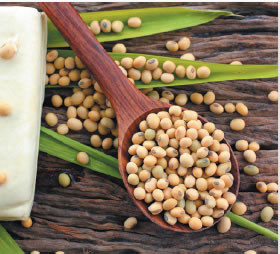Add soy to your diet, but don't subtract other healthy foods
|
Soybeans, a legume, are rich in protein, polyunsaturated fats, fiber, vitamins, and minerals. |
Soy foods can help you build a healthy diet, but their ability to prevent heart disease and cancer remain unproven. Soy foods, from soy milk to tofu, are often touted for their health benefits. But if you add soy to your diet, be mindful about what you are pushing off the plate.
"If you ask if a food is healthy, my general answer is always, 'Compared to what?'" says Dr. Meir Stampfer, professor of nutrition and epidemiology at the Harvard T.H. Chan School of Public Health. "I would not necessarily recommend eating more soy if your baseline diet is already healthy."
Soy for general nutrition
Soy foods are made from the soy plant, which is a legume that produces pods containing soybeans. Soybeans are rich in protein, polyunsaturated fats, fiber, vitamins, and minerals. A single cup provides 28 grams of protein—more than one-third of the daily amount required by an active 180-pound man.
Soybeans end up in countless processed foods, such as soy butter and soy burgers. The most easily obtained soy foods in grocery stores include whole green soybean pods (edamame), dry or cooked soybeans, dry-roasted soy nuts, soy milk, tempeh, and tofu.
Soy's place in your diet
Soy foods are nutritious, but you also have to think about what you are replacing with the soy. The calories that most people consume daily usually remain constant unless they are trying to lose weight or become more physically active and need more fuel. That means if you add soy to meals, you will tend to eat less of other things.
If you eat soy instead of less healthy foods, the nutritional scales tip in your favor. "The worse your general diet, the better soy is going to look," Dr. Stampfer says. "If you eat soy instead of red meat and refined carbohydrate, that's probably going to be a plus."
For example, a potentially healthy soy substitution would be a stir-fry with tofu instead of beef stroganoff, or soybean soup as a side dish instead of a baked potato. However, if your overall diet is already healthy, substituting soy foods might make no real difference in diet quality—or could degrade it.
Soy for men's health
You may have heard that soy is good for your heart or prevents prostate cancer. But these claims are either unproven or come with some important caveats.
Heart health. Preliminary studies in the 1990s suggested that eating 50 grams of soy protein per day reduced "bad" LDL cholesterol—but only by 3%, according to a review of the evidence in 2006 by a scientific advisory committee to the American Heart Association. You would need to eat more than a pound of tofu per day to get those 50 grams of soy protein. It's a lot of effort for such a small impact on cardiovascular risk.
Prostate cancer. So far, studies conducted to find hard proof of soy's anticancer effects have produced mixed results. The evidence for soy-based dietary supplements is also weak. "It's not that these benefits are disproven," Dr. Stampfer says. "It's just that we don't have enough evidence to recommend it with confidence."
The bottom line
Men who eat a generally healthy diet are at lower risk of prostate and other major cancers as well as heart disease—the major causes of death in men. That means getting most of your daily calories from fruits, vegetables, and whole grains. Soy can be part of this mix.
For protein sources, eat moderate portions of dairy (cheese and yogurt), poultry, fish, and eggs. For now, it appears that substituting any of these with soy will not necessarily improve your health.
Try some soy: Here is how |
||
|
Soyfood |
What is it |
How do you eat it? |
|
Edamame |
Green (unripened) soy pods. |
Eat edamame boiled, steamed, or microwaved and lightly salted as a snack or side dish. |
|
Soybeans |
Mature (ripe) soybeans, available dried or canned. |
Use in main dishes, like chili or vegetable soups and stews, or tossed cold into salads. |
|
Soy milk |
Water and finely ground soybeans. |
Substitute soy milk for cow's milk at breakfast, for making smoothies, and for baking. |
|
Soy nuts |
Dry-roasted or deep-fried soybeans. |
Eat as a snack or use in granola, baked goods, or salads. (Watch the sodium in salted versions.) |
|
Tempeh |
Fermented and cooked soybeans. |
Marinate and grill; slice or crumble into stir-fries, casseroles, salads, sandwiches, and stews. |
|
Tofu |
A spongy solid consisting of curdled soy milk. |
Dice into stir-fries, salads, or entrees, or bake and slice into sandwiches or salads. |
Disclaimer:
As a service to our readers, Harvard Health Publishing provides access to our library of archived content. Please note the date of last review or update on all articles.
No content on this site, regardless of date, should ever be used as a substitute for direct medical advice from your doctor or other qualified clinician.
















